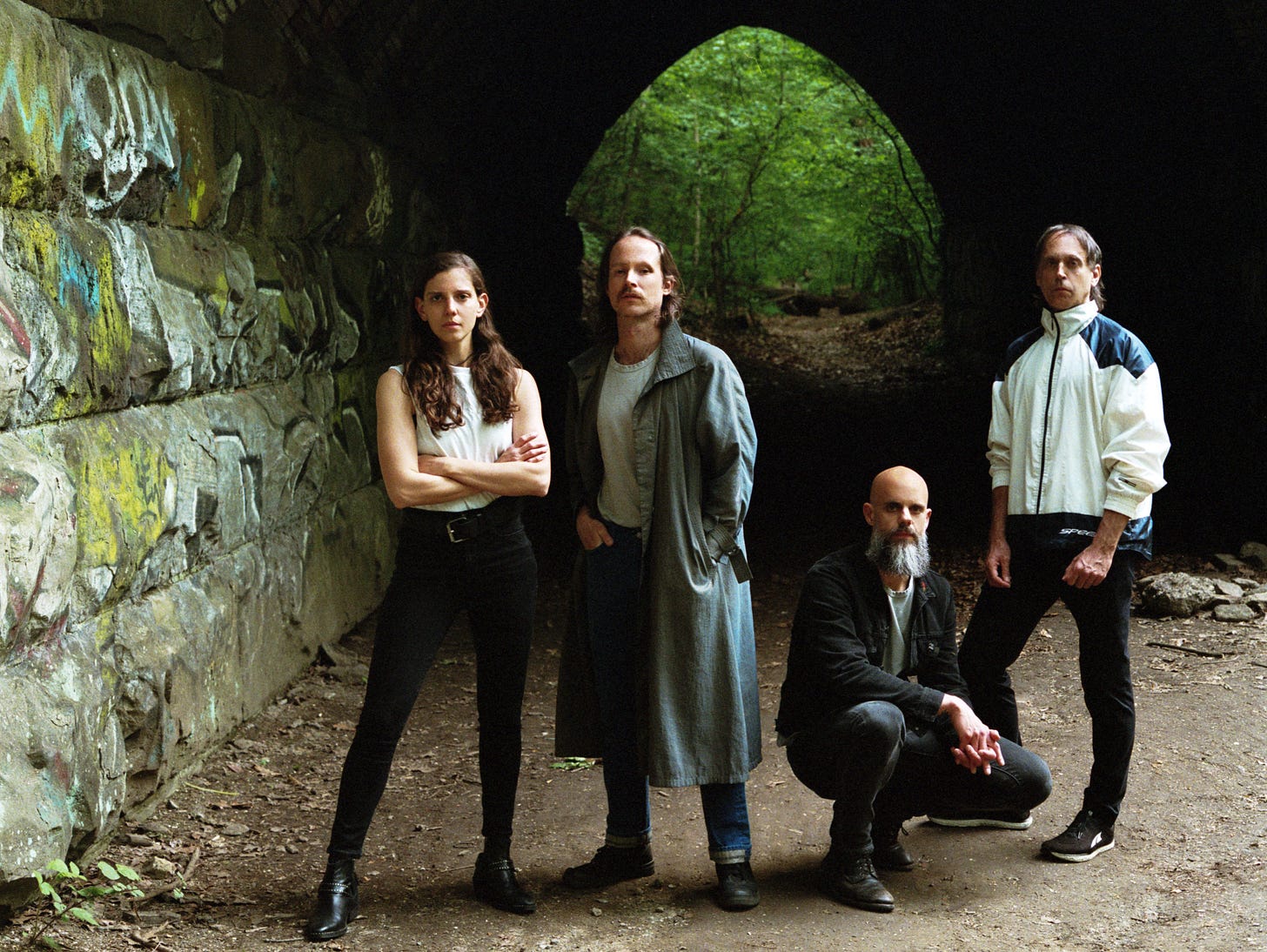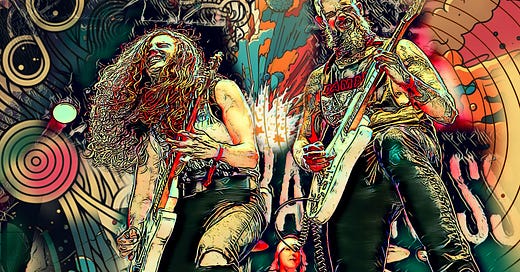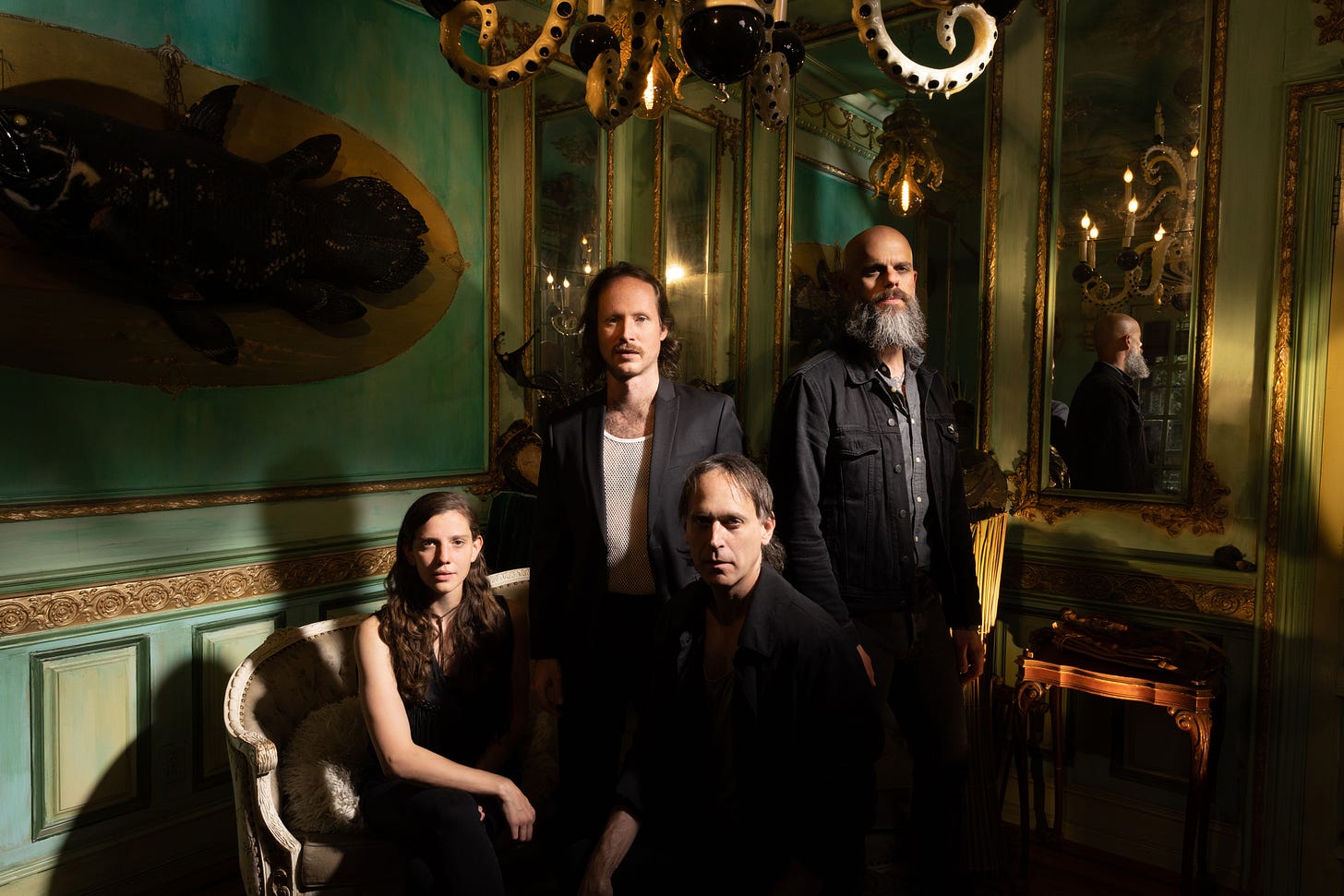John Baizley of Baroness on the fine art of the slow burn
The tour behind bold and brave new album 'Stone' rolls on
Within the first 30 seconds of a conversation with John Baizley, vocalist/guitarist/frontman with forward-looking heavy music quartet Baroness, you realize you’re not speaking with your average 21st century ‘rock guy.’ Intense, eloquent, thoughtful, inquisitive, Baizley is in many ways a modern rock anti-hero, an iconoclast for whom the artistic process is a trial-by-fire during which the worth of both the individual and the collective is ascertained, measured and weighed.
Baroness might ostensibly be described as a ‘metal band,’ but how many modern metal bands view their art as a crucible, a test that must be passed time and again, a dark night of the soul that must be endured in order for the next dawn to shine brighter?
With the release of Stone, quite possibly the strongest effort yet in a career that already boasts a number of classics - the Dave Fridmann-produced duo of Purple and Gold & Grey spring immediately to mind - Baroness has achieved the elusive by stretching the envelope to breaking point while still sounding fully and completely like itself.
As the tour behind Stone - which stops at the Town Ballroom on Sunday, November 26 - rolls on apace, I spoke with Baizley about the artistic process, the significance of instinct, and the source of the intense passion for creativity that guides him.
The record has been out for two months now, but still, every time I listen to it, I’m hearing new things, catching new intricacies and finding new wrinkles. I find that this is the case with all the records that I end up still loving 30 years after they came out…
I feel like that’s always been the case with our music. Even my friends - normally, when I play a record for them, initially they’re like ‘Oh… yeah.. um, this is cool, man… cool.’ (Laughs) And it’s not for 6 months until people start coming back around and saying, ‘Ok, I see what you were going for now.’
Isn’t that the point, though?
It is 100% the point!
The point for me is to create a piece of artwork that grows as time goes on, that challenges the listener and the composer, and that forces you to listen.
Don’t we make music for ourselves anyway, at least initially? You’ve gotta interest and compel and challenge yourself, first…
Yes, absolutely. The biggest mistake, in my view, that some musicians and some bands make - I shouldn’t be too, general, but I think a mistake that is made quite frequently in our industry is that musicians get convinced that the audience is who you’re writing for. And I mean no disrespect at all to the audience - I fully believe that the only way I would be disrespectful to the audience is if I try to guess what they want to hear. The only way to do anything artistic is to use only your own instincts, only the boundaries of your own creativity, and those of your co-songwriters and bandmates. We’re only trying to impress each other.
And… follow me along this line. I don’t actually think that the pitch of the note is what’s important to the listener, or the awesomeness of a drum fill or a guitar solo - I don’t think any of that is what’s important. I think what all of those things are, they’re tools, meant to be used to help the song. And the song is the most important thing. It doesn’t require any specific things with regard to technique, or key, or tuning or tempo - those are just the tools we use to relay our message.
So if there’s a blunt message, if we’re working on something blunt, then the music reflects that. If we’re working on something soft and subtle and dynamic, then the music should reflect that. Essentially, I think it’s the enthusiasm we have as players, as songwriters, composers and singers - that’s what the audience connects to. A good way to look at it is, if you have a song and ten different artists cover it, ten great artists - there’s going to be one that works better than the others. And that’s not because the song’s any different, it’s not necessarily because the playing’s any different - it’s because the artists are putting something in there that people respond to.
And so our job as musicians and artists is to feel something so powerfully in our own music that it transcends. Take the live experience, for example. Is the band onstage convincing? Are they convinced themselves? If so, there is some aspect of that that translates to the audience, and becomes reflected by the audience, and then begins to build the performer up a bit.
I think of music in those terms, and as a result, I’m never writing a song for a specific person or a specific audience, because I don’t know what the life experience of an audience member is. My only hope is that something we do is universal enough and relatable enough and interesting enough and challenging enough that our listeners are willing to invest their own time and their own energy in it.
Can you expound on how important instinct is in this process of investing in the moment?
In many ways, instinct is the most important thing. In a band like Baroness, where so much of what we do is flexible and fluid and dynamic, we use our instinct in real time, in a non-verbal and musical way, on stage and in rehearsal and in the recording studio, to talk to one another as musicians.
Here’s another way to look at it - I think that a lot of times what a listener interprets as instinct is just the character of the individual musicians and the sum character of bandmates responding and generating unique patterns and unique phrases. So the character of what we do is our instinct. The flash and the pizzaz, or whatever - the crazy drum fills and the solos - those are techniques that we practice, and they’re in many ways a culmination of our instincts. But those are the apostrophes and exclamation points and commas of music. The meat, the gristle, the meaning, is in all of the stuff that doesn’t require you to focus on that. The really important pulse is much harder to define - swagger, confidence, poise, the ability to manipulate time and space in a musical way.
It’s more often, in music, what you’re not saying that matters. If four people are in a conversation, there should be a natural ebb and flow. There’s usually a primary speaker, and there are responses, there are physical cues and tonal cues. If four people are screaming simultaneously, nothing is heard, nothing is understood, nothing is settled. So as musicians, our maturity has taught us that the best way to have a story told is not for the person who’s speaking to speak louder, but for the people who are supporting that speaker to give them the space to express something.
We all will, to follow the metaphor, close our mouths when it’s time for someone else to speak. In terms of band diplomacy, I think that’s healthy, but in terms of music, when we achieve that level of communication - that’s hard-earned. You need chemistry, you need familiarity, you need trust…
You need respect…
Yes, absolutely. And you need history, you need to understand the motives and tendencies of your bandmates, so that when we need to utilize the tools we have as musicians, they’re used to support, not to gratify ego or claim attention. It’s a beautiful thing when you’re with a group of musicians where everyone seems to understand that.
I think that if a lot more - not just musicians and artists, but people in general - thought this way, the human experience would be a better one.
Yes. Though there is a place for a bit of ego, at the beginning, I think. The young musician needs to have a little bit of that narcissism just to get on stage and have the confidence to put what they’re doing out there for the world. But you’re not going to last if you don’t realize very quickly that your role as singular voice is absolutely insignificant. You might as well be shouting into the void, if you don’t have a team of people - if you don’t act in concert. You can follow this metaphorical thread as far as you like…
Are there any particular musical role models out there, for you, representing this idea of the whole transcending the individual, through the power of character and charisma?
One of may favorite bands throughout the years has been the Flaming Lips. And it’s not because Wayne Coyne is some absolute virtuoso as a singer. No. It’s because his character is so particular, so incredible, so creative. The music is also full of that character. It’s loose, it’s progressive, it’s inventive, it’s adventurous. I want nothing more out of music than that.
Amen. I wonder, as you’re talking about this idea of respect and maturity feeding the manipulation of light and shade and the leaving of space in music, you are so in tune with this idea because you’re also a visual artist? Is there a correlation there?
There must be. I think that I’m a visual artist and a musician because I have an impulse that I can’t help, whereby I see space in this universe and I just want to fill it, with as much that I have to give as possible. My outlook on music is similar to my outlook on art. It’s a more familiar outlook to visual art than it is to music. In art, we have fine artists, illustrators, designers - all of these different professions within the world of art. I think the job is to hold a mirror up to the universe and say, ‘Hey, look in here, tell me what you see. Ask questions, wonder why, come on this adventure with me.’
But in music, you basically have musicians and you have session guys - those are the only two jobs, and they’re basically kind of similar. So then you get into genre classifications - oh, are you rock, are you alternative, are you hip-hop, are you EDM, are you this or that - and whatever, it’s all the same fucking thing.
And I think of myself as more of a fine artist than a designer. A designer’s job is to relay a message clearly, with style, dignity and grace, in such a way as to sell a product. And I believe a lot musicians are basically graphic designers. You know - ‘Put this type of rhythm to this type of breakdown to a half-time groove here and a full-time groove here and a solo there,’ and that’s how you generate a product that’s consumable. But I don’t give a fuck about consumption! I’m an artist and I make the thing. If there is consumer for it, an audience for it, a demand for it, and investigative mind interested in it, then that’s great! That’s certainly a necessary aspect of being a professional. But my impulse is not to make something for that person, because I’m not trying to sell a product.
In many ways, with Baroness, the product is the four of us. And we’re not gross people. (Laughs) We’re not trying to sell ourselves. What we’re trying to do is write better music, keep ourselves engaged, create challenges for ourselves, be passionate and thorough and investigative, and make sure that by the time we’re done, we’ve given as much as we possibly could and we’ve released into the world as much genuine artistry as we possibly can. That’s the goal.

It’s clear when listening to your music - and this is underscored, boldly, when speaking with you - that you are incredibly passionate about what you do. What is the source of this passion? And how do you hold on to it after 20 years in a business that favors homogeneity over passionate exploration?
A lot of the music that happens to fall under the umbrella of the music I’m associated with, or the styles that I’m adjacent to, or part of - I think it’s anemic. I think it’s vapid, I think it’s soulless, and I think it’s there to elevate the good-looking front-person and get these bands some sort of superficial idea of success when they’re young. But I hate to tell them, by the time you’ve been in a band for 10 years, if your music’s garbage, and your looks have faded, and the flower of youth has wilted, all you have is your music and your creativity. All you have is the quality and the consistency and the sincerity of the music you’ve made. And if that music is superficial to begin with, you’re going to be embarrassed on the stage.
A lot of what’s happening in sort of underground pop that’s been marketed toward teenagers and youth, the messaging is just… why bother? I came up in the 90s, and there was an element of apathy to the music of Nirvana - and Nirvana is absolutely the reason I play music, my favorite band of all time. But there was an element of apathy there. Yet it was portrayed through the lens of a poet. Through the lens of a musical genius. So, anything less than America’s greatest poet of the 90s and greatest songwriter of the 90s - anything less than that, that has the element of apathy, the point of the music is, why bother? ‘Me me me me me, why bother, poor me.’ And I don’t accept that. I don’t accept it for a second.
What I will accept, from any artist, is, ‘I’m not good enough yet. I’ve gotta keep grinding, keep working, keep playing, keep holding myself to a higher standard, keep pushing and pushing and straining my creative muscles until they burst.’ You do this so you don’t end up one of these bands down the road saying, ‘I don’t know what to do, maybe we should return to our roots.’ You know what? Fuck that! Roots are not something you return to. They’re something you always have. If you’re so far from your roots that you have to return to them, sorry bud, but you went too far. You lost the plot. You fucked up. The fire’s gone.
I’ve been terrified since I was teenager of losing that fire. You’d listen to a band’s back catalog as a teenager, and say, ‘How did this band get better and better for the first four records, and then suddenly, start getting worse with each record?’ That scared the hell out of me.
So, in Baroness, we always do everything we can to make sure our music is good. That it’s not resting gently on its laurels or becoming routine or commonplace. Because I don’t want to write anemic music. It’s bad for the soul. I’d go and do something else before I’d ever allow that to happen.
And that passion, born of that fear, is an endless source of inspiration.





